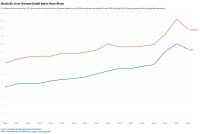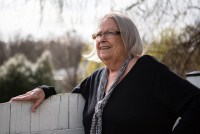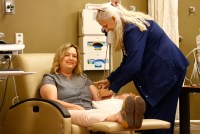Latest KFF Health News Stories
An Arm and a Leg: Wait, What’s a PBM?
Pharmacy benefit managers, or PBMs, are companies that negotiate the prices of prescription drugs. Hear about their role in raising drug prices and the ongoing efforts to regulate this complex industry.
Excessive Drinking During the Pandemic Increased Alcoholic Liver Disease Death Rates
The number of Californians dying from alcoholic liver disease rose dramatically in the last decade, sped by the pandemic.
Groups Sue to Overturn Idaho ‘Abortion Trafficking’ Law Targeting Teens
It is illegal to help a minor obtain an abortion in Idaho or leave the state for one without parental consent. The lawsuit says the ban infringes on the right to interstate travel and First Amendment freedoms.
As Nonprofit Hospitals Reap Big Tax Breaks, States Scrutinize Their Required Charity Spending
Nonprofit hospitals avoid paying taxes if they provide community benefits such as charity care. More states are examining that trade-off, scrutinizing the extent of hospitals’ spending on their communities.
Mental Health Respite Facilities Are Filling Care Gaps in Over a Dozen States
As three years of pandemic stress accelerated an ongoing nationwide mental health crisis, peer respite programs diverted patients from overburdened emergency rooms, psychiatric institutions, and behavioral therapists. Now, more “respites” are opening.
Meet the People Deciding How to Spend $50 Billion in Opioid Settlement Cash
As settlement dollars land at the state level, state councils wield significant power in determining how the windfall gets spent. And, though they will likely include the most knowledgeable voices on addiction, these panels also face concerns about conflicts of interest and other issues.
Proposed PFAS Rule Would Cost Companies Estimated $1B; Lacks Limits and Cleanup Requirement
A proposed Environmental Protection Agency rule calls for companies to disclose PFAS manufactured or imported since 2011. The chemical industry is upset because such compliance would cost an estimated $1 billion, while environmental health advocates worry because the rule wouldn’t ban the chemicals outright.
What You Need to Know About the Drug Price Fight in Those TV Ads
At least nine bills introduced in Congress take aim at pharmacy benefit managers, the powerful middlemen that channel prescription drugs to patients.
Idaho Drops Panel Investigating Pregnancy-Related Deaths as US Maternal Mortality Surges
Amid a years-long rise in maternal mortality rates in the United States, Idaho lawmakers decided to disband a committee created to investigate pregnancy-related deaths.
‘It Was a Bloodbath’: Rare Dialysis Complication Can Kill, and More Could Be Done To Stop It
A venous needle dislodgment is a rare dialysis complication that can kill a patient in minutes. Some experts worry those who treat themselves at home are at increased risk.
Medi-Cal’s Fragmented System Can Make Moving a Nightmare
When Medi-Cal beneficiary Lloyd Tennison moved last year from Contra Costa County to San Joaquin County, he was bumped off his managed care plan without notice before his new coverage took effect. His case highlights a chronic issue in California’s fragmented Medicaid program.
California Promises Better Care for Thousands of Inmates as They Leave Prison
California officials recently agreed to give new parolees a 60-day supply of their prescriptions and promised to replace lost medical equipment in the month after they’re released from prison. The state also agreed to submit Medi-Cal applications on their behalf at least 90 days before they are released.
Montana Adds Protections for Kids in Private Residential Treatment Programs
Programs in the so-called troubled teen industry will be required to provide a 24-hour hotline and unmonitored video calls with family and be subject to more inspections under a new Montana law.
Why the Next Big Hope for Alzheimer’s Might Not Help Most Black Patients
Black patients and other minorities tend to be diagnosed at later stages of the disease, which would exclude them from use of Leqembi. Few Black people were included in the main trial of the drug.
How Health Care May Be Affected by the High Court’s Affirmative Action Ruling
Some medical professionals warn that the Supreme Court’s recent ruling against using race as a factor in admissions could have far-reaching implications for the diversity of medical students, the practice of medicine, and patient care. Here’s what you need to know.
CDC to Reduce Funding for States’ Child Vaccination Programs
Citing the recent debt ceiling deal, the CDC is trimming its funding to child vaccination programs that focus on communities vulnerable to disease outbreaks. The cuts come despite data showing the percentage of children getting vaccinated has dropped in recent years.
Patients Squeezed in Fight Over Who Gets to Bill for Pricey Infusion Drugs
To drive down costs, insurers are bypassing hospital system pharmacies and delivering high-priced infusion drugs, including some used in chemotherapy, via third-party pharmacies. Smarting from losing out on billing for those drugs, hospitals and clinics are trying to convince states to limit this practice, known as “white bagging.”
More States Legalize Sales of Unpasteurized Milk, Despite Public Health Warnings
Distrust of public health authorities, who say drinking raw milk is dangerous, fuels demand for unpasteurized milk products, leaders on both sides of the issue say.
An Arm and a Leg: Credit Card, Please
What do you do when a medical provider asks you to provide a credit card upfront? In this episode, we hear advice about your options in this situation.
Need to Get Plan B or an HIV Test Online? Facebook May Know About It
Twelve of the largest drugstores in the U.S. sent shoppers’ sensitive health information to Facebook or other platforms, according to an investigation by The Markup and KFF Health News.

























